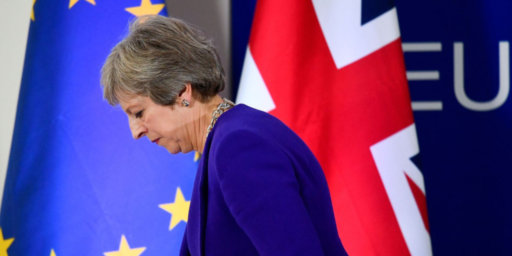European Union Agrees To Brexit Deadline Extension
With just days to go before the end of the month, the European Union has agreed to another Brexit extension. Before we get there, though, thee's likely to be another General Election.

The European Union has agreed to the United Kingdom’s request for an extension on the deadline to complete the Brexit process, pushing the date from this coming Thursday to January 31, 2020, a change that makes it likely that we’ll see a new General Election before the end of the year:
BRUSSELS — The European Union agreed Monday to delay Britain’s exit date from the bloc to Jan. 31, once again postponing Brexit and potentially paving the way for a British general election beforehand.
The postponement came in response to a request from British Prime Minister Boris Johnson, who was forced to ask for more time after Parliament shot down his effort to speed the country out of the European Union by the previous deadline of Oct. 31.
Johnson had said he would get Britain out of the bloc by then with or without a deal to buffer the economic turmoil expected to be set off by the departure. Parliament had different ideas, insisting on legal guarantees that Britain agree to a departure deal before exiting the European Union. It was the first of a string of legislative defeats for Johnson, who has been forced to go more slowly on Brexit than he had wanted.
Ambassadors from the 27 remaining E.U. members agreed Monday to postpone the departure date until the end of January, although Britain could still leave earlier if Parliament ratifies the separation deal ahead of time. In Europe’s jargon-loving precincts, that means Britain has received a “flextension.”
“The EU27 has agreed that it will accept the UK’s request for a #Brexit flextension until 31 January 2020,” European Council President Donald Tusk said Monday on Twitter. Ambassadors agreed to the deal without calling in national leaders for an in-person meeting, a sign that the decision ultimately was not especially controversial.
Leaders are tired of debating Brexit at a moment when many European economies are flagging, extreme parties are still nipping at their heels and many citizens just want to move on. But they also fear igniting an economic blaze by kicking Britain out of the bloc before it is ready.
(…)
Some European leaders view Britain’s continued membership in the bloc with significant wariness. Monday’s delay was granted on the condition that British representatives in the E.U. agree not to obstruct the body’s decision-making while they linger inside the club, as Johnson has at times threatened to do.
More from The Guardian:
The EU has agreed to a Brexit extension to 31 January 2020, with the option for the UK to leave earlier if a deal is ratified, clearing the way for opposition parties to back a general election.
After a 30-minute meeting of European ambassadors, Donald Tusk, the president of the European council, said the EU27 had agreed to the request made by Boris Johnson just over a week ago.
He tweeted: “The EU27 has agreed that it will accept the UK’s request for a new flextension until 31 January 2020. The decision is expected to be formalised through a written procedure.”
The prime minister, who said he would rather die in a ditch than delay Brexit, is now under an obligation to agree to the terms, breaking his pledge to leave on 31 October, “no ifs, no buts … do or die”.
Guy Verhofstadt, the European parliament’s Brexit coordinator, tweeted:
“Relieved that finally no one died in a ditch. Whether the UK’s democratic choice is revoke or an orderly withdraw, confirmed or not in a second referendum, the uncertainty of Brexit has gone on for far too long. This extra time must deliver a way forward.”
(…)
Under the terms of the extension, the UK has three months more of EU membership but it can leave on the first day of any of those months if the withdrawal agreement is ratified in both Westminster and the European parliament in the meantime.
The EU has insisted it will not renegotiate the withdrawal agreement again. The UK also has “an obligation” to nominate a candidate to join the European commission. The prime minister has previously said he will not put forward a nominee.
By agreeing the extension through a written procedure, to be completed by Wednesday at the latest, EU leaders will avoid convening for a summit in Brussels.
Given the circumstances of the current situation, which includes the fact that Parliament has rejected Johnson’s latest attempt at a Brexit deal, that the deadline is only a few days away, and that Parliament passed legislation essentially forbidding a hard Brexit on Thursday, this extension was largely inevitable. What makes this one different from the last two extensions is the fact that it appears to allow the U.K. to exit before 31 January if Johnson can get a deal approved by Parliament before then. As recent events, as well as political developments in London, make clear, though, that’s going to be easier said than done. Now, Johnson will be required to find a deal that is acceptable to both Parliament and to the European Union.
Before we get there, though, there is most likely going to be another General Election before the end of the year. The prospect of any agreement on a Brexit deal without one is basically non-existent, to be honest, and Johnson is obviously hoping that a decisive win by the Tories would give him the political consensus he needs to complete a deal. As things stand, the polling seems to indicate that he might be right. Current polling shows the Tories (34%) with a strong lead over Labour (24%) with other national parties such as the Liberal Democrats (17%) and Nigel Farage’s Brexit Party (11%) pulling up the rear. The other major party in Parliament, the Scottish National Party (4%) continues to poll well in Scotland itself and is indicating that it would support a Parliamentary resolution calling for an early election.
Recently, Johnson has been talking about an election on December 12th, which would require calling an election to be called by November 12th. More recently, though, the Prime Minister has seemed to warm to a proposal by the Liberal Democrats to hold the election on December 9th, which would require an election to be called by November 9th. Before we get there, though, Johnson would be required to seek the agreement of Parliament.
Under the terms of the Fixed Term Parliaments Act passed in 2011, the government must obtain a two-thirds vote of the House of Commons to call an election prior to the expiration of the current term of the government in 2022. Based on some reports, that may not be too difficult. The Scottish National Party appears to be ready to vote for such a resolution based on recent comments by Scottish First Minister Nicola Sturgeon, for example, and there have been signs that both the Liberal Democrats and Labour are open to the idea. All three parties, though, are saying that they will only agree to a new election if Johnson guarantees that there will not be a hard, no-deal, Brexit.
Once that formality is taken care of, Johnson could call a new election, set the date, and the campaign will begin. Depending on how it ends, we’ll either have the consensus that Johnson wants, a new government entirely (which seems like the least likely outcome right now), or it will be back to square one at which point the U.K. will be on the horns of a dilemma with roughly a month-and-a-half to go before another Brexit deadline.
Update: Parliament has, for now, rejected the Prime Minister’s call for elections on December 12th. However, both Labour is saying it would support such a motion if there was a guarantee that there will not be a hard Brexit.





It seems like they should have a do-over on the Brexit vote.
I think that would solve everything.
I’m not so sure Leave would lose if there were a second referendum.
In any case the next election will effectively be a referendum on Brexit. The problem Remainers face is that there are only two authentically Remain political parties. One, the SNP, only runs candidates in Scotland. The other, the Liberal Democrats, probably won’t be able to find enough candidates to contest seats that amount to a majority in Parliament.
@Daryl and his brother Darryl:
IMO, the time to have done that would have been when May’s first attempt at a deal was rejected in parliament.
Remainers, and I say this with all my sympathy, should plan for an eventual Rebrexin, and for getting more favorable trade terms with the EU.
Any guarantee Johnson gives holds about as much water as a contract with trump.
The EU should have extended the deadline to January 31, 2025, with built-in automatic 5 year extensions ad infinitum. See what BoJo and Parliament do with that.
Watched Parliament today. Corbyn make it pretty clear that “taking no-deal off the table” includes eliminating the possibility of a crash-out in December, 2020 if no long-term relationship is negotiated. Reportedly, the EU extension offer will include language forbidding changes to the current withdrawal agreement. The SNP seemed adamant that they would support the Lib-Dem bill only if 16-year-olds and resident EU citizens were allowed to vote. The Lib-Dems seem absolutely set on Nov 9, so that this is the last week Parliament meets before being dissolved.
I don’t see where they’re going to reach any sort of compromise. I can imagine Johnson and Macron in January, with a new EU Council President that I have heard is probably not as accommodating as Tusk, saying, “We told you that Parliament would just fritter it away.”
It boggles my mind how insular all sides in England are being right now. I mean, Johnson can agree and Parliament can approve all the “no hard Brexit” bills they want. Let’s say they do so. January comes and England *still* can’t agree internally on what it wants (by far the most likely result). Nothing stops the EU from saying-no more extensions, we’re done. And then you get a hard Brexit forced on you.
All this talk of English politics, and no conception, even now, that they are only one side of the table. I have no sympathy for Brexit at all, but watching Labour, Lib Dems, and the rest squabble among themselves about stupid s*** like Nov 9th vs 12th, and splitting the Stay vote so ludicrously that the Tories are STILL the largest party, is farcical.
Sadly, the last few years of democracy in America and the UK remain neck and neck in their race to the bottom, and autocrats start to look good compared to these feckless wonders.
@Michael Cain:
It could be some in the House of commons withhold approval of an exit deal, because they know there’ll be another extension, so one may as well hold out for a better deal.
If so, they are going against those who want to crash out (why??), and thus vote down any exit deal to run out the clock and get a no-deal exit.
It would be amusing to see opposing forces working at cross-purposes to maintain the staus-quo, if the stakes weren’t so high.
@Kathy:
Always an extension, until that one time there isn’t. I’m waiting for the official language of this extension to see what Macron got. Rumors are that the UK has to functionally give up its Council vote on all matters, not just Brexit.
Corbyn did a wonderfully insane rant this morning, but he’s delusional. He still thinks that if he just wants it badly enough, someone will hand him the PM-ship, and all the other groups involved (including the EU Council) will bow down and give him the other things on his lists.
I didn’t think I’d ever write this, given his reputation: Boris has played the hand he was dealt better than any of the others have played theirs. With the possible exception of the SNP, but they’re playing a long game.
@Kathy:
I always admire a conspiracy theory that is at least self-consistent. The best “answer” to your question that I’ve seen is that a whole lot of big private money (eg, the Russians) think that the EU is going to pass a bunch of financial transparency laws that will hurt them, so they are pushing Brexit to turn the UK into a giant offshore money-laundering place (the Bahamas, Bermuda, and Jamaica apparently can no longer handle the volume). They want a crash-out because they have large short positions on the pound…
@Michael Cain: There’s also a lot of tax hiding that is expected to be revealed to the daylight under the new EU financial laws and a lot of rich Brits are panicking.
Frankly, between Brexit, the demand for a GE, and the political catfighting it’s all gotten so complex on the U.K. side I have no idea what is going on. Whenever an equilibrium starts to take hold one or more winning players decides to try to take advantage of the situation and asks for more, either splitting his side or causing an abstaining group to start pulling on the other side.
The EU doesn’t want to just kick the U.K. out since it knows full well how damaging a no-deal Brexit will be, but they’re also getting very tired of these continued extensions.
@Michael Cain:
That might eventually happen. Possibly as early as January 31st. this latest Halloween deadline came close to passing without an extension.
I’m wondering how bad would a no-deal brexit actually be. I’ve this notion such things are both worse than expected in some ways, and not as bad as expected in others.
I keep thinking to the Y2K bug. It was definitely real. But 1) many of its effects started taking place in the late 90s, like credit cards expiring in 01/01 being flagged as having expired over 90 years ago, 2) many of the effects were not crucial; ie a missile won’t launch because it can’t tell the date, or determines the date is 1900. More likely it won’t launch if given the launch command, if it carries a time/date stamp, as it wouldn’t match its clock. 3) there was ample time to prepare in small and large ways, and most people did; at work, I recall, we upgraded some accounting and inventory/sales systems that would work with years of 4 digits (and we still upgraded them in DOS, if you can believe it).
All in all, I think the actual reality of a no-deal brexit is best left not experienced.
@Doug Mataconis:
I think you’ve somehow been misled on this.
I can’t find an up to date LibDem candidate list, but they stood in 629 of 650 total in 2017.
I certainly haven’t seen anything that suggests they won’t be running similar numbers next time.
@Michael Cain:
@grumpy realist:
There’s an element of these in the mix, I think, though less than a lot of people think.
UK money in tax havens is around £500 billion.
The main financial interest IMHO is not so much the “investors”, whether domestic or overseas but the managers.
Some in the City who make a lot of money running offshore banking/accounting services that span a range from legitimate investment management, via corporate financial efficiency, through legal tax minimisation and on to tax evasion and more or less outright money laundering.
A lot of those “island tax havens” are these days just brass nameplates and a local agent; the funds are run out of London.
Of the top tax havens in the world these are all British Overseas Territories:
Anguilla
British Virgin Islands
Bermuda
Cayman Is.
Turks & Caicos
Isle of Man
Jersey
Guernsey
And they are largely just P.O. boxes for the City.
These funds are in the tens of trillions of pounds; only a about a tenth (?) is “evasion” and even less “laundering”; but that’s still hundreds of billions.
And generally the more dodgy the deal, the more lucrative the fees.
A lot of City linked “fund managers” etc. have become multi-millionaires to billionaires on the strength of this business.
That’s a lot of incentive to keep the business model going, and a lot of money to spread about doing so.
That said, I still think its of less relevance than more intangible factors (which in turn need really to be divided by influence on Brexiteer leaders and Leaver vote base):
Leadership:
– the burgeoning obsession with “sovereignty” and the increasingly skewed analyses of recent UK history
– the collective mental trauma of a section of the Conservatives right wing over the “betrayal” of Margaret Thatcher, and their rather irrational association of this with an anti-EU stance
– the problems of a shared language in the growing influence on the UK Right of the discourse of the US Republican conservative/libertarian right
– related to this the influence of the “trans-Atlantic” think tanks and political lobbyist e.g. the UK “Tufton Street Mob” and Spectator networks and their links to the US networks of the Koch’s Mercer’s etc.
Base:
– the incapability of the British state to manage the reconstruction of economically depressed former industrial towns and residual low skilled populations
– the chronic housing (affordability) crisis related issues, and (related) the attrition and precariousness of living standards in a sizable segment of the working class
– anti-immigration attitudes and extremely muddled understanding of the EU relation to immigration policy
– general alienation of large elements of the working class from the political process, and related educational/informational issues
@Kathy:
That’s my inclination too, and was from the referendum: accept it as politic because reversal looks tricky and damaging, go for EEA/EFTA type Single Market/Customs Alignment arrangement
The trouble is, May’s silly “Red Lines” burnt the ground under that, as she determined to end free movement of labour, thus ruling out Single Market membership, and gleeful Brexiteers grabbed this and howled for more, while others (out of mendacity or folly) declared Customs Alignment or “Free Trade” could substitute for the Single Market.
Furthermore Johnson and the ERG appear to have planning to rule out future change towards an SM/CA arrangement.
The bill the government was intending to drive through unscrutinised included:
Meaning:
It is impossible to trust Johnson and the Brexiteers not to pull a fast one whenever they see a chance.
Latest: Labour announce they are now ready to vote for a December election.
Game on.
@Just Another Ex-Republican:
Actually there are good reasons for November 9th vs 12th being an issue if you assume Alexander Boris de Pfeffel-Johnson is trying to be sneaky again.
Which is at this point a reasonable default assumption.
@JohnSF:
Argh. Delete “November” insert “December”
@JohnSF: There’s also a sizeable number of Brexiters who seem to think that because there was a 52%/48% vote once, that means the U.K.and the E.U. should do everything ultra-right hard Brexiters demand from here on in to the end of time.
Very much a bunch of spoiled brats.
Seems the general election, or whatever they call it over there, is going to take place on Dec. 12th.
It seems hard to imagine a campaign of just about 7 weeks, but it also seems alluring.